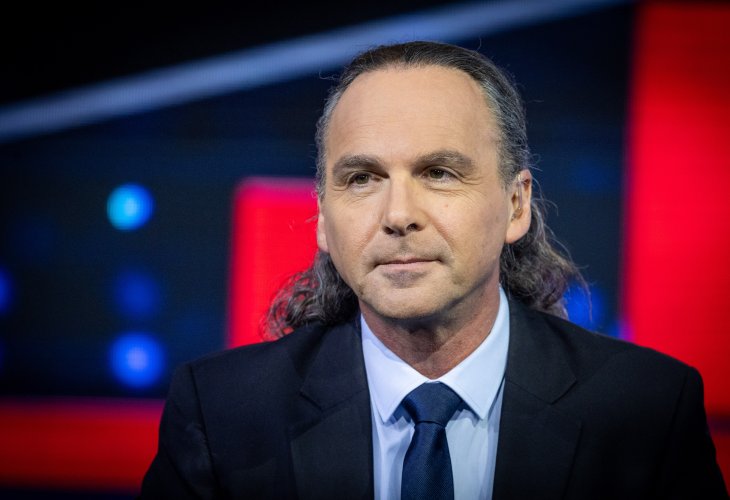Avishai Ben-Chaim's Journey and the Complex Landscape of Israeli Identity
Author and commentator Avishai Ben-Chaim discusses his views on Israeli society, the second Israel, and the ongoing struggle for representation, coinciding with the release of his new book.
 (Photo: Yonatan Sindel / Flash 90)
(Photo: Yonatan Sindel / Flash 90)"Blaming me for the division between the 'first Israel' and the 'second Israel' is like blaming Newton for gravity. I just exposed, articulated, and explained the factual reality," says Dr. Avishai Ben-Chaim in an interview with Yedioth Ahronoth journalist Ra'anan Shaked.
Ben-Chaim spoke about Israeli politics, the situation following the war, and his new book on the Haredi sector—the first since his much-discussed book "The Second Israel: The Sweet Message, the Bitter Repression."
In Ben-Chaim's home, age 55, there are Jewish bookshelves and large portraits of the sages of Shas. He previously completed a doctorate on Rabbi Ovadia Yosef and explains what he has experienced since the start of the war.
"Like all of us, the massacre was a terrifying shock for me," he recounts, "I felt the need to be a soldier. I was called up to reserve duty here in Judea and Samaria, mostly as a scout, driving around in a vehicle, and at the same time, I decided to remain silent. I know there are many people hurt by my words even though my intentions are good, and I know I touch a sensitive wound, so now I am quiet."
At the beginning of the war, one protester attacked him violently, claiming he was responsible for the terrible situation. "It was a very upsetting incident," he admitted in the interview. "A hostage recovery activist called me and said: We need you to write something calling for their release now; we need your voice—a public intellectual representing the pro-Bibi camp. So, I wrote such a text, suggesting a move for hostage release before entering war, but I told him: They won't use it as they don't want to break the barrier of hatred between us. At the same time, I agreed to cover the hostage families' protest, and there someone attacked me physically. I left the scene because I don't engage in confrontations. Even on Twitter disputes—I don't fight people personally, I always withdraw. I endure, I swallow it."
"Hatred against Israel is deterministic and eternal—it was also the historical-philosophical stance of Benzion Netanyahu, and it is still evident today," he continues. "Anyone who talks about 'the day after' or anything related doesn't understand Jewish history. I'm amazed that the IDF doesn't invite me to lecture officers on Jewish history and Zionist history to understand: there is no 'day after.' Will the war end? No. The Jewish people will have to stand by their sword. David's sword will remain outside. The basic understanding is we must win this war. To defeat Hamas. To topple its rule in Gaza."
Later, when asked about a deal to release the hostages, he said: "Such a deal can be made because I think we have a few months now if we're waiting for Trump and truly believe he might shift the equation."
Ben-Chaim was asked who constitutes the second Israel, and he answered: "The definition of the second Israel is very flexible. It's a circle and more circles that partially overlap. The basic circle is the traditional, Mizrahi, believing, loving periphery. Then there is someone not belonging to this circle but overlapping it in some way—for example, he's not nationalist like the core of 'second Israel' but a Mizrahi fighting; he's part of it too. This public is accused of being against our beloved Ashkenazi brothers. If it were true—wouldn't this public vote for Bibi? No, they vote for Bibi because they say: this is what's good for the Jewish people. And sometimes a public under elite oppression chooses someone from that elite to lead them. In this context, Bibi fills a role that elevates and honors his public. You'd say: Wow, what a great leader we have. Look how he speaks! How educated he is! It's a social function that Bibi fulfills. And another thing: see how 'second Israel' pushes Bibi to adopt its value system. He will put on a *tallit*, put on *tefillin*, say 'With Hashem's help' and 'Baruch Hashem'."
Regarding the question of whether there are insufficient religious and Mizrahi individuals in the media, he said: "There is a lack. It's inconceivable that someone from the marginalized group, without a red card, will be in Galatz, and the implication here is: a Mizrahi supporting Bibi. It won't happen."
About Miri Regev, he said: "Miri Regev fights for the rights and representation of the public, and she is the public's democratic choice and a figure. The red card said: we won't give representation to a Mizrahi supporting Begin. In our generation, the red card says: we won't give representation to a Mizrahi supporting Netanyahu. It's the same thing. A Mizrahi who crossed camps, accepted the hegemonic values, then got representation—it happens. But the heavy bloc of Likudniks is the marginalized bloc."

